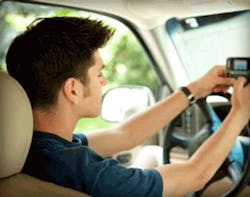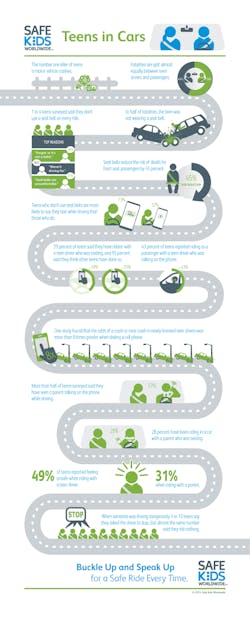Off-the-Job Safety: One in Four Teens Say They Don’t Use Seatbelts
Vehicle crashes are the No. 1 cause of death for teenagers. Tragically, in half of the fatal crashes, the teens were not wearing seatbelts.
A survey conducted by Safe Kids Worldwide and funded by the General Motors Foundation explores the driving and buckling habits of teenagers. One in four surveyed teens said they don't buckle up on every ride.
Their top reasons for not buckling up: They forgot or it wasn't a habit (34 percent); they weren't going far (16 percent); or the seatbelt was not comfortable (11 percent). Asked why other teens don't buckle up, one in three teens (33 percent) said going to a party was a reason.
The survey also addressed the perilous practice of distracted driving. Thirty-nine percent of teens said they have ridden with a teen driver who was texting, and 95 percent said they think other teens have ridden with drivers who were texting.
Teens who don’t always use seatbelts were more likely to report that they text while driving than those who said they wear a seatbelt every time. About 43 percent of teens reported riding as a passenger with a teen driver who was talking on a phone.
These behaviors reflect the habits of their parents. More than half of teens said they have seen a parent talking on the phone while driving, and 28 percent have been riding in a car with a parent who was texting.
Nearly half of the surveyed teens reported feeling concerned for their safety when riding with a teen driver and 31 percent of teens said they have felt unsafe with a parent driving.
When asked what teens did in a situation when in a car with someone driving dangerously, four in 10 teens said they asked the driver to stop, but almost the same number said they did nothing.
“It can be uncomfortable for anyone to speak up when they feel unsafe riding in a vehicle, and perhaps even more so for teens riding with their peers,” said Mike Robinson, GM vice president of sustainability and global regulatory affairs, who serves on the boards of both Safe Kids Worldwide and the GM Foundation. “The results of this research further underscore the importance of reaching teens with the life-saving messages to buckle up during every ride and to speak up when they don't feel secure.”
Tips for Families
Safe Kids Worldwide offers these tips for families:
- Buckle up on every ride, every time. This is important for everyone, both drivers and passengers.
- Talk to teens and kids about ways to speak up if a driver of any age isn't driving safely.
- Be a role model in all your driving habits.

